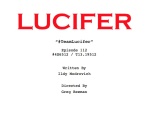Tom Ellis de "Lucifer" sobre la 'última historia de redención' del Diablo
Por Natalie Abram 25 enero, 2016
The Devil is coming to primetime.
In Fox’s new series Lucifer, the disillusioned Lord of Hell (Tom Ellis) has abdicated his kingdom for greener pastures in Los Angeles, where he runs a lush nightclub and spends his days gleefully outing humanity’s deepest fears and desires.
But when he lacks the power to crack into the mind of Detective Chloe Decker (Lauren German), Lucifer turns his attention to helping the LAPD solve crimes, all in the name of uncovering the biggest mystery of all. And therein lies how a lot of comedy is infused into a series about the Devil, which is based on the titular DC Comics character.
EW sat down with Ellis on the Vancouver-based set of the Fox drama to get the inside scoop on the show, where he’s drawing inspiration (David Bowie!) and to find out what it’s like to play the devilishly handsome, well, devil:
ENTERTAINMENT WEEKLY: What’s your take on the Devil?
TOM ELLIS: One of the biggest things about him is that he’s struggling with this personification of himself, this human version of himself. We’re taking the notion that we’re about five years into his having left Hell, and without him realizing his humanity started to feed into him, and he started to experience things that he didn’t experience before, like feelings and emotions and possibly even caring about other people other than himself. He doesn’t know that that’s what it is, but it creates an odd sensation with him, which is why at the end of the first episode we see that he goes back to see [the therapist] Dr. Linda Martin (Rachael Harris), because he’s having this existential crisis, as he puts it, to talk to her about these things that he’s experiencing. He’s someone who, on the surface, appears content with the cards that he’s been dealt, but actually there’s a real sense of discontent and bitterness towards his father about the title he was given and what that’s carried with him over the millennia.
What can you tease about why he left Hell?
Well, in his own words, he left Hell because he was bored. He was bored of playing a part in this game that his dad had set up. He says that he wants to believe in free will, people taking responsibility for themselves and not having these scapegoats and figures around, so that was his reason for leaving. He just didn’t want to be tarred with that brush anymore.
What are the consequences of him being away from Hell for so long?
The consequences of that is that the heavenly order has had to change somewhat, and it’s especially left his brother, Amenadiel [DB Woodside], begrudgingly guarding the gates of Hell while Lucifer is off having a perceived great time.
Do you feel like he’s inherently bad?
This is one of the moral questions that are thrown up within the show, actually. I mean is he bad because he’s inherently bad or is he just bad because dear old dad said that he was? It’s about the questioning of authority. Just because someone has decided that this is the label you’re going to have your whole life, is that necessarily right? I mean, I like to think that this is the ultimate redemption story.
Even in the pilot, he’s accused of being soft towards humans. Does that make him double down at any point to prove that he can still be bad?
He doesn’t have this empathy for every human being. In fact, he’s used most of this complete disdain and bewilderment about choices that they make and things that they believe in, which is why Chloe has such an impact on him really, because she’s not affected by the way that he is. He’s not able to draw stuff out of her like he is everybody else. He doesn’t appeal to the feral urge in her like he does with all other women, and as much as he can’t get his around it it actually draws him toward her. It’s the pursuit of knowledge ironically that he’s after in humanity.
What does that working dynamic between Chloe and Lucifer look like moving forward?
Well, moving forward, he starts to become so intrigued by her that he basically starts to follow her on her cases. As that unfolds, you realize he doesn’t really care about the cases he’s on, but he cares about finding out about her. He wants to know what make her tick. That becomes his case. His pursuit of Chloe then leads him to making a deal with her boss at some point, and that becomes more of an official role alongside her in her detective work, but it’s always about what he can’t get out of the situation, not about solving crimes.
Does he have any plans for the people of Earth or at this point, is he just sort of enjoying it?
No, he’s here for the ride. The whole point is he’s bored of this role, this role of punisher. He’s bored of these people coming down to him. He just is like, “I’m done with this job. I’m done. I’m going to go and have a holiday, a sabbatical, a vacation.” I don’t think when he first came here that he really planned on staying as long as he has, but actually quite likes it.
Is there anything that can kill him?
We work under the assumption that he’s immortal, but that is tested throughout the series.
How do you get into the mindset of the playing the Devil?
My take on Lucifer was pretty much laid down by Tom Kapinos when he wrote the original pilot script for it. I remember reading it for the first time and I was about four or five pages in thinking this is so funny, and I know how I would want to do this if I was going to do it. In terms of like getting into a mindset, I use music all the time when I’m working. When I first got the job, I started to create a playlist, which has now grown and grown and grown to about 85 songs. I use music that would either be used as music in the show, or music that he might listen to himself, or something that suggests something about himself. The Rolling Stones was a heavy part of the original script, so there’s lot of Stones and some classic ‘60s good rock on there, AC/DC as well and the Who, lots of David Bowie, because the original artwork for the image of Lucifer was based on David Bowie. We used him in the pilot. When you first go into [Lucifer’s bar] Lux, we got David Bowie’s “Fame,” and that’s become the running theme.
Lucifer’s got eclectic taste in music, because he’s a man who’s lived for such a long time, and so there’s stuff on there from classical music right through to modern stuff like the Black Keys. I use that, basically, to then just get me into it. I put it on in the car every morning when I drive into work and I put it on in the trailer, and it just gets me back to where I started working with this character when we did the pilot. I’ve always found this quite helpful to do when you do a pilot, so that later on down on the road, I put on the playlist and it immediately takes me back to the headspace I was in.
How close is the show staying to the comics?
It’s, to put it bluntly, not really staying close to it at all. We’ve used it as our inspiration for the characters. I mean, I actually didn’t know it was based on a graphic novel until after I got the job, and that’s down to me. It also says a lot about what I took as my source material and the original scripts that Tom wrote, and then the versions it went through to what we got on screen for the pilot — that was my fixed reference point. There are elements of the graphic novel, but this is not in any way a literal take on the graphic novels. The nice thing is that Neil Gaiman contacted me personally, actually, after seeing the pilot, and he was very effusive about how much he enjoyed it and what we’d done with it.
A big part of the show, and why it’s worked to this point is that everything about the show is delivered with a sense of fun. Lucifer has a sense of fun about life; he just likes to play with people. But the sense of humor of the show is what makes the show entertaining as opposed to dark.
So he always has his tongue in his cheek then?
Yeah, and certainly the way the stories are told, there’s an element of that as well.
What message do you think the show sends about morality?
I love the ambiguity of morality. Obviously, lots of people assume this is a show about the Devil being an evil person and blah, blah, blah — lots of people want to jump on that before they’ve even seen it. One thing I’ve realized since getting this job is that this is a character that people feel like they know. This is like Father Christmas or Santa Claus or someone. It’s a world famous fictional/nonfictional character — however you want to put, but it’s a thing that people think they know this character. I think what’s fun about this show is that we’ve taken that character, and everyone’s presumptions about it, and we’ve used it to hold a mirror up and ask people, “Maybe if you’re going to ask anything morality-wise just hold a mirror up to yourself and take responsibility for your own actions.”
Does he look at himself as the hero of his own story?
I think he looks at himself as the answer, but actually, when he’s really honest with himself in his real moments of vulnerability, he isn’t. He’s just a kid with dad issues.
http://www.ew.com/article/2016/01/25/lu ... -devil-fox 
































































